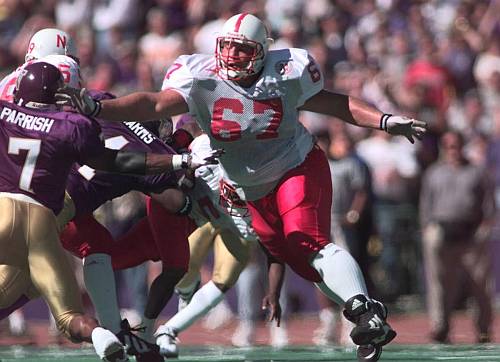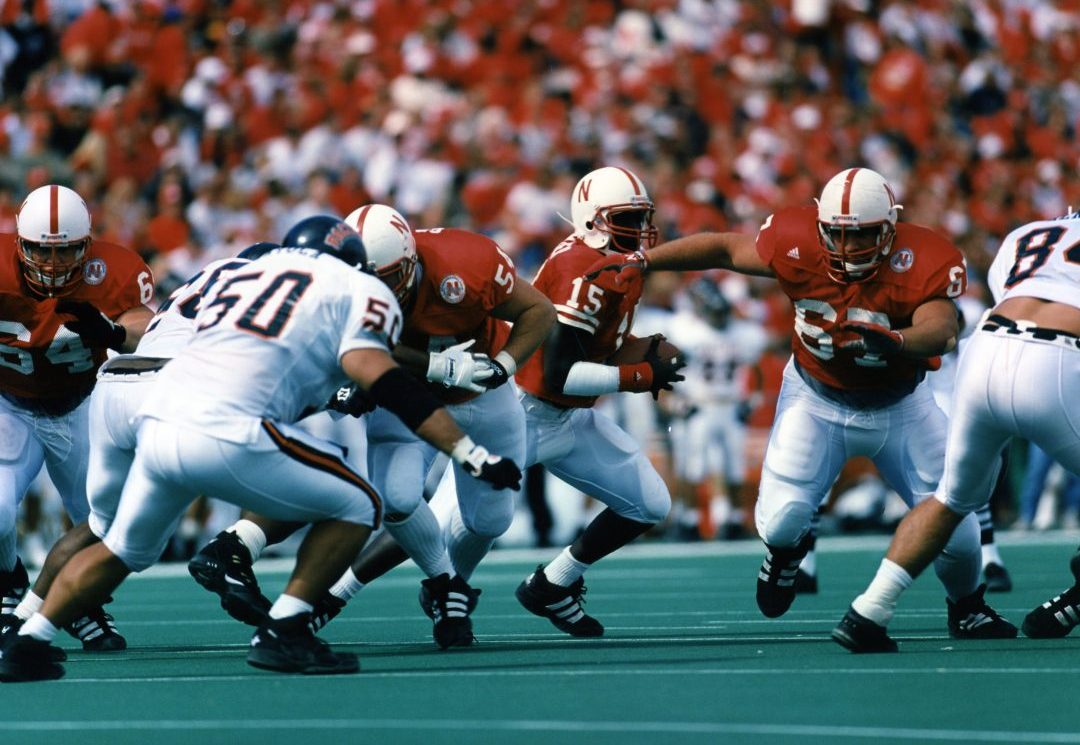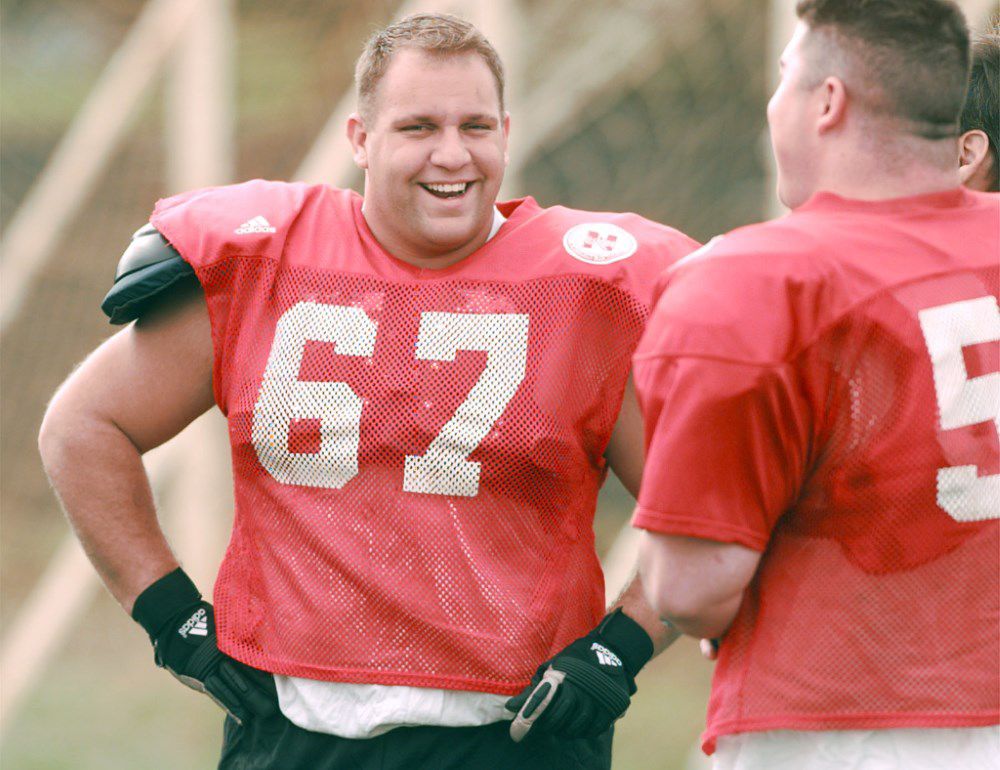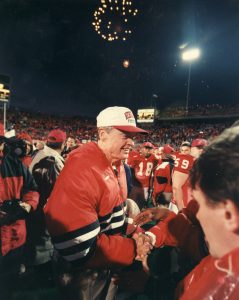Anatomy of an Era: Aaron Taylor, Part 2

Excerpted from Chapter 56, No Place Like Nebraska: Anatomy of an Era, Vol. 1 by Paul Koch
Anatomy of an Era: Aaron Taylor, Part 2
Q: Tell me a little about Coach Milt Tenopir. His techniques, his demeanor, his methods?
Aaron Taylor: Oh, simplicity. Simplicity. We had a pretty technical offense even though it all kind of looked the same, but Coach Tenopir probably did the best job of instilling confidence in you. Keeping it simple, but expecting perfection.
That’s one of the things I loved about him: in the five years I was there he never changed the way we blocked technically. Never. So what you did was, for 5 years you did the same thing day in and day out. And the only way to get better at anything in life is just repetition. So when you’re sitting there and doing that for 5 straight years there’s only one way to go, and that was up. He never changed his coaching technique, never changed his philosophy, and never changed his blocking techniques.

(Unknown/Uncredited)
And to me, that’s a recipe for success: Do one thing and do it well. I was telling a guy the other day, we were talking about the local high school football team and I said, ‘They have twenty different plays that they block twenty different ways. We had twenty different plays that we blocked two ways. If it was an outside play we blocked it one way and if it was an inside play we blocked it a different way.’ And they stayed the same. (Now, I’m just talking interior offensive line, I’m not talking fullbacks or tight ends or receivers, because you’ve got motion and different formations and those things.) But for us, if it was an outside play and it was Ahman Green or Lawrence Phillips going right we blocked it one way, and if it was an inside play between the tackles we blocked it another way, and we did that for five years. And we did that so well, because that’s all you do.
Q: And the defenders knew you were going to do it!
AT: Absolutely, and that’s the beautiful thing about Tenopir’s blocking schemes, because they knew exactly what was coming at ‘em. And a lot of times, Paul, I would point on the ground to the defensive tackle and I’d say, ‘Dish, we have him back to number 32, linebacker.’ So you’re sitting here telling that you’re gonna double-team this tackle and you’re gonna take him back to the linebacker behind him. But the thing is, if you’re technically sound and you do your job that you were taught, it doesn’t matter what they do or if they hear you; you have a way to combat it and get the job done. It doesn’t matter if the linebacker stunts or if the defensive tackle slants, if you did the job that you were taught you weren’t gonna lose.
Q: That must have been demoralizing to the defense?
AT: Yeah, (laughs) it was great for us. But the thing is, you just couldn’t screw it up. Because if you did, the play’s gonna fall apart. But I tell you what, what a deal.
Q: And Coach Dan Young?
AT: Probably one of the most fun coaches I’ve been around. You know his attitude. He was a very good coach for us, knew the plays just as well as anyone there, technically sound.
Coach Young was probably the lighter side of the two. I remember really young in my career it was Coach Young that came down and talked to me and was trying to get me to be more aggressive and not passive. That was Coach Young more on a personal level versus a coach level, which I enjoyed. You could joke with Coach Young a lot more. And gosh, I don’t want to make that sound bad -because you could also talk with Tenopir- but it was different, you know what I mean? I want to say a ‘players coach,’ but in a different way. I’m having a real tough time saying it, but you couldn’t have Coach Tenopir without Coach Young and you couldn’t have Coach Young without Coach Tenopir.
Q: Kind of like Batman and Robin, eh?
AT: (laughs) Exactly. You can’t have one without the other.

Taylor at practice (Courtesy Omaha World-Herald)
Q: The question is, who is Batman and who is Robin?
AT: Coach Young would have to be Robin, wouldn’t he? I don’t think Tenopir would settle for anything less than Batman. (laughs)
Q: What about the different personalities on staff?
AT: Oh boy, where do you start? Of course, you go to Osborne: cool, calm, collected. One of the things I loved and respected about him was that it didn’t matter if you were an All-American athlete or a walk-on from Harvard, Nebraska, he appreciated the work that you gave him, he knew you personally, he knew your family and he just had a genuine interest in all of that. He would talk to me about my family down in Texas: “Has your dad retired from the Air Force yet?” And down to the walk-on from North Platte: “How is your dad doing, your mom doing? How’s school going?”
I remember being in the NFL and talking to a couple players from Florida State and one guy from Penn State about their coaches. And the guys from Penn State? Paterno didn’t know them, he would sit up in the tower at practice and say, “Hey number 54! You need to be doing this…” And there was a receiver from Florida State and I asked him, ‘How much interaction did you have with Coach Bowden?’ And he said, “Oh, about 15 minutes or so.” And I said, ‘15 minutes a day, or what?’ and he was, “No, no. That was my whole career.” Can you believe that?
Osborne knew every single player he had, every staff member he had. He was a coach. He wasn’t a figurehead, he was a coach. And to me that’s the biggest compliment he could have. He knew all about the receiver on the right side of the field all the way across to the receiver on the left side of the field. He knew what they were supposed to do, how they were supposed to accomplish it, and the techniques involved with all that. And if Coach Tenopir was busy coaching somewhere else I could turn to Coach Osborne and say, ‘Hey Coach, on this play I’ve got a three technique. Am I supposed to get the middle linebacker or the backside linebacker?’ and he would literally walk me through the steps of what I was supposed to do. And in meetings I could turn around and ask that question of Coach Tenopir and it was the exact same way that Coach Osborne taught me. That’s the beauty of it: everything was consistent from top to bottom.
Q: Unity of one mind?
AT: That’s exactly right. So you had him, then you had Coach Solich… I loved Coach Solich, you know? Running Backs coach and Assistant Head Coach. Fiery. He’d get on people, yet he was also a lot of fun. I loved working with him. Us offensive linemen? We kept telling him he could be an offensive lineman because he was as short as us. (laughs) We had a lot of fun with him.
I remember Turner Gill just being a mini-Coach Osborne. I loved the way he worked: he had great respect among the players, but he was still willing to be a player’s coach, if you will. You could just see him developing as a coach. He’d be running across the field and pitching it to Frazier and Berringer and Frost, playing catch with those guys, throwing balls to receivers. But yet, had a very good understanding of the game. And I could do the same thing that I did with Coach Tenopir and Osborne: I could ask Turner what I needed to do on a play and he’d know and he’d teach you.
Coach Brown? Same way but kind of your spiritual guy, a little bit more of your upbeat ‘rah-rah.’ I’ve never seen a more fiery Christian than him.
Q: The Apostle Paul might have given him a run for the money…(laughs)
AT: (laughing) All the coaches, top to bottom, had their own personal style, but they had one common goal and they all knew what they were doing from top to bottom. Crazy deal.
Q: Looking across to the other side of the field, what can you tell me about the defensive coaches?
AT: I tell you what, I would have loved to play for Coach Charlie McBride. I think he was about as fiery a coach as I’ve ever seen. I think he was very technically sound.
I loved the fact that the defensive side of the staff was so aggressive. Everybody from Darlington (who was pretty aggressive in his techniques), and you had Coach Samuel and Nelson Barnes, you had Coach Bohl and Kevin Steele. How about that nutjob? He was awesome. And Coach Bohl? Great assistant. Not so much coordinator, but a great assistant.
So you had a good group of coaches over there that was just relentless and aggressive, and they did a hell of a job of coaching these guys up. I never really got fully involved in their meetings or any of that kid of stuff, but you always had admiration for them because they had their guys ready -be it practice or game time- all the time.
Q: I heard that sometimes non-defensive players would try to sneak over and listen to Charlie give his pregame speech.
AT: Sometimes you didn’t have to sneak over, you could hear it coming out of the showers. (laughing) But I tell you what, those guys came out of that shower pregame speech just absolutely fired up, which was awesome. It would have been a fun time playing for those guys. It really would have.

Available on Amazon.com
Q: Was there anything else that set those teams apart from others in history?
AT: I would just say what strikes me the most was the group of players that we had was so tight, the coaches that we had were so tight. There was respect amongst everybody, there was really no one person that was trying to be bigger than the system. And everything from -this is just crazy- everything from the coaching staff to the administration to the trainers to the academic staff with Leblanc and Zimmer to the weight staff, there was really no one trying to show anyone up or think that they were the end all, say all. And it just fostered great communication, great commitment, a great work ethic that created a synergy. The synergy that created? You’re going to accomplish much more than what that group should normally accomplish, you know what I mean? With everyone on board and no one’s trying to be the star and you’re willing to make sacrifices for you and your teammate or whatever situation? You make those sacrifices for the betterment of the team and you’re gonna do nothing but just flourish.
I look back to those days and I think about it, and what strikes me more than anything is just that right there. And one of the difficult things was -as I moved into my professional career- that’s the most difficult thing I’ve had to deal with: you know that if you’re a Realtor and if you’re trying to sell a home you’ve got another agent who’ll try to backstab you to get that 3.5% cut. Or whatever. When I was in sales it was the same way. To me? ‘I’ll take the cut and you take the cut, it doesn’t matter as long as we’re making the company money, we’ll all get rewarded in the end. Let’s quit trying to jump ahead and be the star and be the greedy person.’ Boy, when I joined the corporate world that stuck out. I had a hard time adjusting to that. I really did.
Q: Gave you a better appreciation for the concept of ‘teamwork’?
AT: Absolutely. I remember sitting down and talking to Jack Stark about it. We actually got a group together to talk about it, and it’s called a Level 5 Leadership Group. Basically, Paul, I just had some trouble taking what I learned and what worked so damn well in college and moving into the professional world. And not that you necessarily didn’t expect that, but when you have a bunch of employees working for the same goal and then you’ve got two or three rogue guys? It can botch the whole damned thing. And that’s what was disappointing coming from the background I came from and seeing how it worked and developed and was just an awesome deal. Boy, you get one or two bad apples and you can see how it can fall apart pretty quickly.
Q: Do you recall any bad apples while you were playing? Some that had to be brought into line?
AT: No, not really. You had your guys and a few that were lazier… or you could take the Lawrence Philiips case, for example. Osborne wanted him off the team and that was the deal. I remember being part of that Unity Council and sitting right there and discussing Lawrence Phillips. And Osborne said, “Guys, I’m kicking him off the team. He’s gonna have to get this counseling. If you want him off the team he’s off the team for good.”
And this is why I admire the man so much, because he took a lot of heat for the deal: “If you want him off the team, he’s off the team. If you want him back on the team I need some rules and regulations that you want out of him on top of what I’m gonna make him do, and this is what I’m going make him do: X,Y,Z.” And he ended up saying, “If he misses anything I require him to do, he’s done. Let me know what you decide.” He left and we sat there and talked about it with Jack Stark in the room. We said that he had to show up and go to the counseling deal, do all of Osborne’s stuff, and we put restrictions on him: if he missed a class he was done, if he missed a workout he was done, if he missed his running for the next two months or however many months he was gone. But that was the deal. Osborne let us decide the punishment and then when he’d come back and play. I mean, ultimately, Osborne’s going to be responsible because he’s the head coach, but he was willing to take the heat and be the front man for what the group decided.
Q: The point you make is that the media made it out like it was all due to Coach Osborne’s imperious decision rather than bearing heavily on you and your fellow Unity Council members’ shoulders?
AT: Right. And whether it was a little wheel or the big wheel in a big, intricate clock, unless we were all functioning as one it wasn’t going to work.
Q: Do you have a favorite game?
AT: I would have to say the Florida game would have to be, but there were so many. Probably the Florida game, just because we weren’t expected to win and we go down there and every single player for Nebraska was excited, they all did a hellacious job from the defensive line to the linebackers to the defensive secondary to the offensive line to the receivers to Tommie and Ahman and Lawrence and all those guys. Every single guy had just an awesome game.

It was just so much fun, because we weren’t supposed to be playing with them at all. And the next thing you know every single guy shows up and performs and it’s 62-24 or whatever the score was, you know what I mean? We went from being nobodies who shouldn’t even belong on the same field to absolutely crushing these guys. Just the feeling of it all, because we knew what we did in ’94 and then to replicate it in ’95? Because we were so close in ’93, the ‘Unfinished Business’ in ’94 and then it didn’t seem like we got the respect in ’95, you know? After having two good, solid years you go into that Florida game in ’95 without that respect, and just to cement it like that and go, ‘Boom, this is us, boys! Deal with it. We’re a damn good football team. Give us some respect!’
Q: Going back to the Florida State game after ’93, were you in sitting the stands with the rest of the redshirts for that game?
AT: I was in the stands.
Q: Anything stick out to you about that game?
AT: Just the emotion and what a weird feeling it is being a member of the crowd. Being a member of the crowd yet being a part of the team and knowing a little bit more about what’s going on than the normal fan. You had highs and lows. I remember having the feeling, ‘Yes, we’re gonna win the championship.’ And then the next minute having that feeling of, ‘Oh, we’re losing.’ Then, ‘Hey, we’re gonna win again.’ Just that whole thing. And just the emotions the last quarter, the ups and downs.
And quite honestly? The last thing I remember about it was, ‘Damn, the game’s over. How are we gonna get to the bus?’ (laughs) You remember where that old Orange Bowl stadium was: just a shit hole. And halfway scary whenever you walked out, you know? ‘How do we get back to the hotel?’ (laughs) What a deal.
To be continued….
Copyright @ 2013 Thermopylae Press. All Rights Reserved.
Photo Credits : Unknown Original Sources/Updates Welcomed